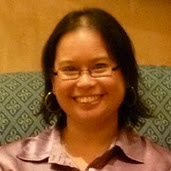 Below is an excerpt from a blog by Bethany Lam. A link to her blog is at the end of this excerpt.
Below is an excerpt from a blog by Bethany Lam. A link to her blog is at the end of this excerpt.
Book Notes: "Leaves from the Mental Portfolio of an Eurasian," Sui Sin Far (Edith Maude Eaton) (1909)
The daughter of a British Chinese mother and a white British father, Sui Sin Far (Edith Maude Eaton) endured great racial prejudice to become a respected Chinese-American journalist-in a time when being Chinese in the United States was a major disadvantage.
In this compelling autobiographical essay, Far explores the evolution of her own understanding of her mixed-race identity.
Far begins by recounting the first time that she realized that other people saw her as being "different," when she was just four years old and living in England. She soon learned to push outsiders away to preempt having to suffer their possible prejudice. At 10, she moved to New York City, where she discovered that she, too, carried racial prejudice towards Chinese people. Her family next moved to Canada, where Far and her younger siblings were received as novelties, but treated somewhat more humanely. As the years passed, Far continued to suffer considerable anguish at not fitting in, even within her family (where she was viewed as being too emotional). This internal pressure, combined with the poverty of her family, prompted her to strike out on her own as a writer for a newspaper.
Far shrewdly leveraged her racial difference to make it not just a liability, but also an asset to her career. She became known for her ability to get insiders' perspectives on North American Chinese communities and their positions on various issues. Whereas much of mainstream white society avoided contact with the Chinese, Far willingly entered their homes and neighborhoods. Her own status as a Chinese woman-though tenuous because of her whiteness-smoothed the way for her interviewees to welcome and talk to her in ways they never would have with fully white outsiders.
In "Leaves," Far's journalistic experience shows in her unflinching ability to ask hard questions and state hard truths regarding her identity as a successful but still marginalized Chinese/mixed-race career woman. Recurring themes include alienation/double-alienation, objectification (both race- and gender-related), suffering (especially on behalf of others) and racial hypocrisy. She mentions several Eurasians who are passing and even uses the term "pass" in these descriptions (416). One account could almost be that of Rena in Chesnutt's House Behind the Cedars: a girl who passes, becomes engaged to a white man, and then jeopardizes their relationship by revealing her racial makeup. (Fortunately, this girl's story ends better than Rena's! This outcome was by no means guaranteed, though.)
Far's essay isn't a white-bashing screed. She describes rampant racial prejudice among minority and majority people alike. Her solution to the problem of racism echoes Chesnutt's in "The Future American": "My mother's race is as prejudiced as my father's," she writes. "Only when the whole world becomes as one family will human beings be able to see clearly and hear distinctly. I believe that some day a great part of the world will be Eurasian. I cheer myself with the thought that I am but a pioneer" (412). In racial mixture and solidarity the world will find harmony, she concludes. For herself, she combines this philosophy with strong individualism. As she explains in her final paragraph, "I have no nationality and am not anxious to claim any. Individuality is more than nationality. 'You are you and I am I,' says Confucius. I give my right hand to the Occidentals and my left to the Orientals, hoping that between them they will not utterly destroy the insignificant 'connecting link.' And that's all" (418).
Far, Sui Sin (Edith Maude Eaton). "Leaves from the Mental Portfolio of an Eurasian." 1909. Before They Could Vote: American Women's Autobiographical Writing, 1819-1919. Ed. Sidonie Smith and Julia Watson. Madison, Wis.: U Wisconsin P, 2006. 406-18. Print.
http://www.bethanylam.net/blog/leaves-from-the-mental-portfolio
















